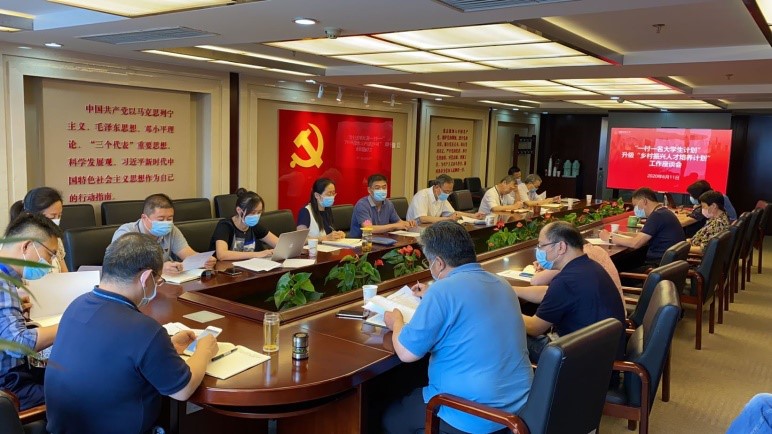 On 11 June 2020, the Open University of China (OUC) held a work conference to upgrade the “One College Student Per Village” Programme to the “Professionals for Rural Revitalisation” Programme.
On 11 June 2020, the Open University of China (OUC) held a work conference to upgrade the “One College Student Per Village” Programme to the “Professionals for Rural Revitalisation” Programme.
The conference aimed to put into effect the guiding principles of the First Congress of the Communist Party of China of the Open University of China, to serve the strategy of “Creating Excellence and Improving Quality” in degree education, to cultivate more talented professionals who understand agriculture, support farmers, and are rooted in rural areas, to boost the effective connection between comprehensive poverty alleviation and rural revitalisation, and to promote the transformation and upgrading of the project.

OUC vice president Lin Yu presided over the conference. OUC vice president Ju Chuanjin, responsible leaders of relevant departments, and relevant teachers attended the roundtable conference.
At the conference, basic information about the “One College Student Per Village” Programme and thoughts on how to upgrade it were reported. The attendees held discussions on the “Work Scheme for Upgrading the ‘One College Student Per Village’ Programme to the ‘Professionals for Rural Revitalisation’ Programme” and “Thoughts on Implementing the ‘Professionals for Rural Revitalisation’ Programme.” Comments and suggestions were made.
Ju Chuanjing indicated that upgrading the “One College Student Per Village” Programme is a timely, necessary, and significant measure. The “One College Student Per Village” Programme, as a major part of the practise of the “Four Orientations” educational philosophy (oriented towards rural needs, local needs, occupational needs, and the needs of ethnic groups), has trained a large number of farmer university students. It has been recognised and affirmed by students and teachers from the OUC system, and the local committees of the Communist Party of China and local governments. Although a series of phased achievements have been made through the programme, there have been some weaknesses. It is necessary to make timely summaries to upgrade the programme. Ju Chuanjing underlined the need to achieve the overall upgrading of the programme, to adapt to the requirements of the era and the national strategy, to serve China’s rural areas, agriculture, and the overall development of farmers, to focus on important work, to positively advance supply-side reform, to offer different levels of courses for different needs, to strengthen the applicability of the courses, and to carefully to put all of these tasks into practice.
Lin Yu indicated that the need to upgrade the programme should be investigated against the background of pursuing the successful rural revitalisation strategy, and that the implementation plan for the “Professionals for Rural Revitalisation” Programme should be further improved in line with the results of the investigation. He underlined the priorities during the course of the programme upgrading as follows. The first is to boost “the same quality in the same university” by furthering teaching reform with the help of the upgraded programme. The second is to promote the synchronised upgrading of teaching management and service, and to achieve the seamless integration of degree education and non-degree education. The third is to explore the integrated design and implementation of secondary vocational education, junior college education, and undergraduate education. The fourth is to accelerate the upgrading and improvement of course learning packages. The fifth is to give full play to the role of two-level coordination between the headquarters and branches in order to raise the level of enthusiasm.
Since the “One College Student Per Village” Programme was implemented by the Ministry of Education in 2004, more than 500,000 farmer university students who are able to remain in rural areas and apply their knowledge for the development of agriculture and rural areas in China have been trained. The programme has contributed to agricultural modernisation in China, the cultivation of a new type of professional farmers, the construction of rural community organisations, the transformation and upgrading of rural industrial structures, and poverty alleviation.
By Fu Jinfeng, OUC